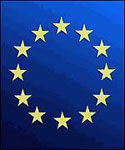 UPI: EU diplomats face a deepening dilemma over Iran’s disputed nuclear program as they try to avert an Israeli strike on the country.
UPI: EU diplomats face a deepening dilemma over Iran’s disputed nuclear program as they try to avert an Israeli strike on the country.
United Press International
 BRUSSELS, March 16 (UPI) — EU diplomats face a deepening dilemma over Iran’s disputed nuclear program as they try to avert an Israeli strike on the country.
BRUSSELS, March 16 (UPI) — EU diplomats face a deepening dilemma over Iran’s disputed nuclear program as they try to avert an Israeli strike on the country.
There is a fear such an action could drag the Europeans into the conflict.
Germany has said it will back Israel, a position that European Union on the whole isn’t too keen to adopt, analysts said. German news magazine Der Spiegel said German Chancellor Angela Merkel’s forthright pledge to come to Israel’s aid displeased German Foreign Ministry officials.
Earlier in March, Germany, France, Britain and the United States offered Iran a new opportunity to restart talks on its nuclear program. The offer was made under the umbrella of the P5+1 contact group of nations, which includes China and Russia.
EU foreign affairs chief Catherine Ashton offered Iran renewed talks “within the coming weeks at a mutually convenient venue” to reach “a comprehensive negotiated long-term solution which restores international confidence in the exclusively peaceful nature” of Iran’s nuclear program.
Ashton wrote the letter in response to Iran’s initiative in September last year to resume talks.
Ashton’s diplomatic effort is being backed by German diplomats. Merkel’s senior aide Helga Schmid has been in telephone contact with Iran’s deputy nuclear negotiator Ali Bagheri.
Iran says its nuclear program is for peaceful purposes only. But Israel, along with the United States and other Western countries, suspect Tehran aims to build a nuclear weapon.
U.S. President Barack Obama told reporters a diplomatic response to Iran’s nuclear program “is deeply in everybody’s interests — the United States, Israel and the world’s — to see if this can be resolved in a peaceful fashion.”
Obama’s comments came a day after Israeli Prime Minister Binyamin Netanyahu expressed impatience with waiting for results of diplomacy and sanctions on Iran.
“Israel must reserve the right to defend itself, and after all, that’s the very purpose of the Jewish state: to restore to the Jewish people control over our destiny,” said Netanyahu, who met Obama in Washington.
As prime minister of Israel, he said, “I will never let my people live in the shadow of annihilation.”
So far the EU has avoided taking sides but Merkel, to her own diplomats’ dismay, has often spoken out in support of Israel in the event of a conflict.
No other European country has so clearly placed itself at Israel’s side, Der Spiegel said. “For me, as the German chancellor, Israel’s security is never negotiable,” Merkel said in 2008 during a speech to the Knesset. “And consequently, in the hour of truth, these cannot remain empty words.”
As a result of past pronouncements Berlin is pinning its hopes on a successful outcome of the talks with Iran. In a conflict Germany may be called upon to do more for Israel than supplying weapons to counter an Iranian attack.
“Merkel has virtually given the Israelis carte blanche to do as they please,” the news magazine said, citing unnamed German diplomats. If a conflict erupts, it may be “ultimately impossible to remain neutral in such a conflict.”
Luxembourg Foreign Minister Jean Asselborn indicated Europe saw no alternative to talks with Iran. “If they fail, an Israeli military strike is practically inevitable. We have to prevent that at all costs,” Asselborn said.
Meanwhile, like the Americans, Europeans are hoping the sanctions will put enough financial pressure on Iran to lead it to talk, analysts said.
This week Iran lost its SWIFT link for money transfers in a further tightening of the sanctions. The Society for Worldwide Interbank Financial Telecommunication said it will halt service for about two dozen Iranian banks that have been sanctioned by the European Union, including Iran’s central bank.
The SWIFT cutoff will likely affect Iran’s ability to make purchases worldwide, financial analysts said.
Iran will likely find other means of completing major transactions but the SWIFT ban will affect all Iranian businesses that depend on interbank electronic transfers.


